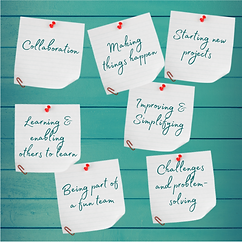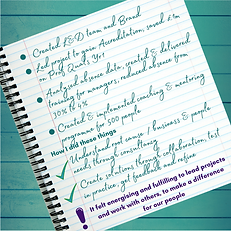How to change your career when you don't know what you want to do
You’ve got a good job but it doesn’t light you up. Something’s missing. You’d love to do something that feels more meaningful, that makes you want to go to work in the morning. But how do you figure out what that thing is?
CAREER CLARITY


First, know that you’re not alone. Many people feel like this. I spent the first 20 years of my career feeling like this. I was desperately bored in my work but just didn’t know where to start. How could I figure out what I wanted to do?
It was after my 2nd career break to go travelling, when I found myself back in that so dull (to me – other people loved it but we’re all unique) career that I decided I’d finally had enough. I couldn’t stand the thought of another 20+ years being bored, living just for the weekends and things I did outside of my day job.
So here’s what I did. It worked for me and doing similar has worked for many of my clients.
How do you change your career when you don't know what you want to do?
You’ve got a good job but it doesn’t light you up. Something’s missing. You’d love to do something that feels more meaningful, that makes you want to go to work in the morning.
But how do you figure out what that thing is?
Identify what you really enjoy doing at work.
Write down all the things you enjoy doing at work. Anything that makes your day go faster and gives you a sense of satisfaction and achievement.
I didn’t go deep into this initially, I just dumped a load of words onto a piece of paper. Things like:
Problem-solving / Collaboration / Making things happen / Starting new things / Improving processes / Being part of a fun team / Enabling people to learn / Learning new things and putting them into practice.


Think about the things you know you do really well. When other people tell you you’re clever, or you’ve done something fantastic. When you know you’ve achieved your goals and more. When you know you’ve made a difference.
My notes were something like this:
I’m really great at: Helping people learn / Explaining complex topics in a simple way / Analysing information to make good decisions / Having ideas that improve the way we do things / Getting things done, on time and to a great quality / Leading and developing a team / Starting new projects / Influencing people / Building relationships.
Identify your biggest achievements, how you did them and how you felt about them.
If you’re struggling to think of your achievements, ask other people (your manager or colleagues). Often we impress people without realising, and they notice and remember things that we don’t.
Once you’ve identified your biggest achievements, thinking about HOW you did them gives you additional insight into what you’re great at.
Thinking about how you felt about your achievements gives you insight into whether you’d want to do them again.


💡 Just because you're good at something, doesn't mean you want to do it again so think about the energy and enjoyment you gained from your achievements.
Identify what matters to you at work.
This one is about Hertzberg’s Motivation to Work (motivation-hygiene) theory.
Motivators are those things that give us positive satisfaction, arising from the elements of the work that give us intrinsic satisfaction such as recognition, achievement, autonomy, personal growth, etc plus benefits and culture that enable us to work in alignment with our values and what matters to us.
My blog: What really matters to you can help you with this.
Hygiene factors are the things that don’t lead to prolonged higher motivation, though if they’re missing will cause dissatisfaction. They’re extrinsic to the work itself, and include things like your working environment, being micromanaged, company policies and salary.
Identify what matters to you outside of work.
Think about what you’re passionate about, what gives you a sense of meaning and purpose.
Do you have hobbies that you wish could be your job?
Do you volunteer for something that’s close to your heart?
Maybe you already have a 'side hustle' that you'd love to develop - if you had the confidence? (See my blog: Is fear getting in your way?)
What would you do, if you were guaranteed success?
Imagine you literally can do any type of work you want. You don’t have to worry about earning a certain amount. You don’t need to get more qualifications or experience.
Everything is in place for you to make the change tomorrow and it will work out for you.
Thinking like this can open up your ideas, bringing to the surface things you’d love to do but have always suppressed because you don’t believe it can happen.
Bringing it all together.
Look back through all your notes and ask yourself these questions:
What themes are coming through, repeated in most if not all of the sections?
What skills and strengths have you identified that you want to use in your work?
What are the things that are ‘must haves’ in your new career?
What are the ‘definitely don’t want’ things in your new career?
Use your answers to create an ‘Ideal job essential criteria’ guide so you can stay on track with what you're looking for in your career change.
What if I'm still not clear?
Be curious!
Talk with people who love what they do. What do they love about their work? How did they get into it? What skills and strengths do they use?
Browse job boards. What appeals to you? If anything causes a bit of excitement – or even interest – take note of what causes it. Then think about how you can explore this more.
Are there people in your existing network who do things you’re interested in? Arrange to ‘job-shadow’ them if possible to get more insight.
What can you try out? Maybe on a voluntary basis, or part-time.
How else can you learn more about something that interests you? Maybe a course, or join a networking group?
If you enjoy parts of your current role, try job-crafting - read my blog to find out what this is and how you can do it.
There are so many different jobs and types of work. What will really light you up may not yet have come onto your radar.
By trying out some different things you can build a fully informed idea of what you really love doing.
Take a note of what you enjoy and what you don't want to do.


And if you'd like some more help...
My Career Clarity programme is designed with people like you in mind. We'll explore your unique strengths profile and your values to gain clarity about the type of work you want to do, and the type of organisation that will be the best fit for you. Learn more here.
Hi, I'm Karen Felton
I love enabling people to understand their strengths and values, so they know what they want to do in their career and in their life.
When you understand your strengths and values, everything becomes clear and you can take your next steps with renewed confidence.




